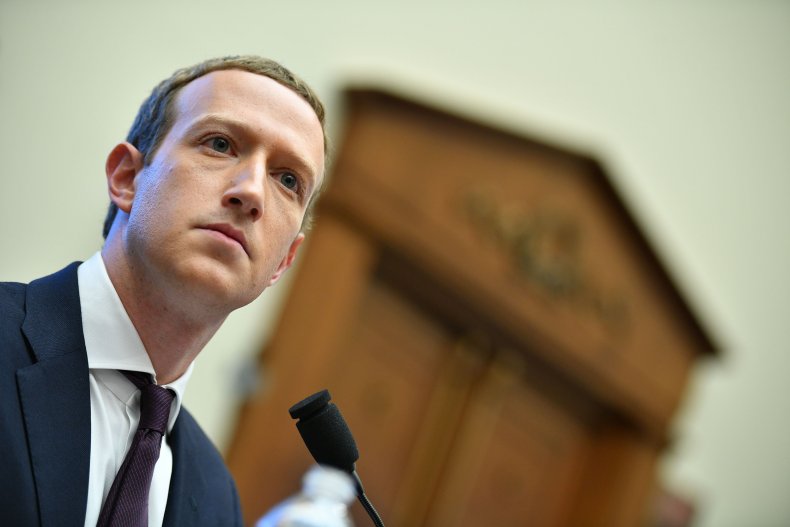Zuckerberg Says Facebook
Could Restrict Posts about
State Violence If U.S Faces
'Prolonged Period of Civil
Unrest'

3 June, 2020
Facing widespread criticism, Mark Zuckerberg has defended Facebook's decision not to remove a controversial post by president Trump. However, he also said if the U.S. is entering a "prolonged period of civil unrest," it may review policies relating to posts about violence.
The social network's founder fueled outrage and rare displays of employee revolt this week after failing to take action against an update from the president on May 29 that included the phrase "when the looting starts, the shooting starts."
Protests against police brutality erupted across the U.S. following the killing of George Floyd, 46, who died while being arrested by police in Minnesota on May 25. Unlike Twitter, which removed Trump's post for "glorifying violence," Facebook left it online—sparking complaints and resignations inside the company
In a video meeting with Facebook staff Tuesday, Zuckerberg reportedly said ongoing civil unrest could force executives to evolve policies about what government leaders can post about state violence, The Verge reported.
He said: "If we were entering a period where there may be a prolonged period of civil unrest, then that might suggest that we need different policies, even if just temporarily in the United States for some period, compared to where we were before."
In the video call audio obtained by The Verge, Zuckerberg reportedly said a review of Trump's post determined it did not ultimately violate Facebook policy
According to Recode, which also obtained audio of the call, Zuckerberg said his teams were currently considering adding "labels" to posts by world leaders that could be perceived as inciting violence—but stressed that doing so would take time.
Zuckerberg is quoted as saying: "We basically concluded after the research and after everything I've read and all the different folks that I've talked to that the reference is clearly to aggressive policing—maybe excessive policing—but it has no history of being read as a dog whistle for vigilante supporters to take justice into their own hands.
"This isn't a case where [Donald Trump] is allowed to say anything he wants, or that we let government officials or policy makers say anything they want."
The term "when the looting starts, the shooting starts" can be traced back to 1967 when a Miami police chief known for tough tactics of African American communities used it to describe an outbreak of crime, angering civil rights leaders, NPR reported.
Zuckerberg said he was aware his decision would "lead to a lot of people being very upset inside the company and a lot of the media criticism we're going to get."
On Monday, tensions inside the company appeared to boil over as workers launched a "virtual walkout"—with many tweeting rare public criticism of leadership.
According to The New York Times, which obtained the audio, the meeting was moved to Tuesday from Thursday after hundreds of employees staged the protest.
Yesterday, Facebook software engineer Timothy Aveni confirmed he was resigning from his position over the company's handling of the president's post. "Facebook will keep moving the goalposts every time Trump escalates, finding excuse after excuse not to act on increasingly dangerous rhetoric," he wrote.
"I've spent a lot of time trying to understand and process the decision not to remove the racist, violent post Trump made Thursday night, but Facebook, complicit in the propagation of weaponized hatred, is on the wrong side of history."
Zuckerberg's explanations for keeping Trump's post were called "incomprehensible" by a trio of leading U.S. civil rights leaders who met with him on Monday.
"He did not demonstrate understanding of historic or modern day voter suppression and he refuses to acknowledge how Facebook is facilitating Trump's call for violence against protesters. Mark is setting a very dangerous precedent for other voices who would say similar harmful things on Facebook," a joint statement said.
Zuckerberg said in a May 30 post on his personal account that he struggled with how to respond to Trump's post and attempted to explain why it remained online. "I know many people are upset that we've left the President's posts up, but our position is that we should enable as much expression as possible unless it will cause imminent risk of specific harms or dangers spelled out in clear policies," he wrote.
In response to the leaked audio this week, a Facebook spokesperson said Zuckerberg had an "open discussion" with employees and was "grateful for their feedback."




No comments:
Post a Comment
Note: only a member of this blog may post a comment.